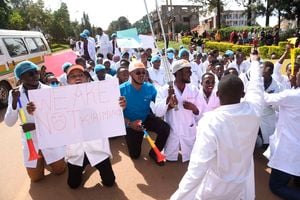
Workers erecting a sign at NSSF's Social Security House offices in Nairobi.
The National Social Security Fund (NSSF) has become the latest State Corporation on the spot over skewed staff hiring.
The development comes after it emerged that the institution has continued to hire staff from some dominant ethnic communities, with more than 17 tribes left out, failing the staff ethnic diversity test.
The damning state of affairs comes just days after the Public Service Commission (PSC) last week revealed that Kikuyu and Kalenjin communities have the lion’s share of jobs in ministries and State departments, with at least 26 per cent of the positions or 27,256 out of the 75,031 slots.
The revelation came days after the courts nullified hiring revenue service assistants by the Kenya Revenue Authority over ethnic imbalance skewed in favour of the Kikuyu and Kalenjin communities to the disadvantage of others.
Senators on Tuesday took to task NSSF chief executive officer David Koross over the ethnic imbalance at the corporation.
Appearing before the Senate Cohesion, Equal Opportunity and Regional Integration Committee, Mr Koross revealed that Kalenjin, Kamba, Luo, Luhya and Kikuyu communities control 73.97 per cent of the workforce at NSSF.
In documents presented before the committee chaired by Marsabit Senator Mohamed Chute, the five dominant communities control three-quarters, or 74.25 per cent, of the corporation’s workforce.
According to the documents, NSSF has 1,047 employees as of March 7, 2024, with the five communities taking 779 slots.
Leading the pack are Kalenjins with 197 staff or 18.78 per cent, Kambas come second with 188 or 17.9 per cent, and 136 or 12.96 per cent are Luos.
The Luhya community is fourth, with 132 employees or 12.58 percent, while Kikuyus, with 126 employees, close the top five.
None of the other 22 communities, there are only 27 communities represented in the staff establishment, have more than 100 employees at the State corporation, with some 14 having less than 10 staff.
The 14 include Teso (nine), Borana (eight), Pokomo (six), Njemps/Ilchamus (three); Kuria, Mbeere, Rendile, Swahili, and Taveta have two each, while Bajun, Elmolo, Nubi, Samburu and Suba have one each.
Perpetuating the ethnic imbalance, Mr Koross revealed that of the 15 employees NSSF hired on the contract between December 29, 2022, and March 7, 2024, the five dominant communities took 10 positions, with the rest going to Kisii (two), Embu, Turkana and Kenyan Somali.
“We hired four Kalenjins between December and March 7, 2024 when we filed this report,” Mr Koross told the committee.
The revelations triggered massive reactions, with the committee members questioning NSSF’s continued hiring of staff from specific communities.
“It is no longer a mentality, it is now a fact that if our person is not at the helm (of leadership) then you cannot get a job,” said Tharaka Nithi Senator Mwenda Gataya, whose Tharaka Community has no single staff at NSSF.
The legislator decried that some communities are being treated as voting tools and sidelined when it comes to hiring in public service.
Nominated Senator Betty Montet asked why the NSSF has continued to hire people from the dominant community despite data showing the ethnic imbalance.
“You found the mess there, we agree. But you have continued to do the same. You have hired more Kalenjins than others,” Ms Montet said.
According to a December 29, 2022 report, NSSF had 199 employees from the Kalenjin community, representing 18.24 percent of the workers, with Kamba coming second with 191 members or 17.51 percent.
Coming third were Luos, with 146 employees representing 13.38 percent of NSSF workers, with Luhyas and Kikuyus having 136 and 135, representing 12.47 percent and 12.37 percent, respectively.
Between December 29, 2022 and March 4, 2024, at least 55 people have exited NSSF, mostly from the dominant communities.
Although the National Cohesion and Integration Commission states that an organisation may not at any given time have employee representation from all the 45 ethnic communities in Kenya, none of the ethnic communities should be more than 30 per cent of the total workforce.
“Some of the tribes in this country are just outsiders. They are only needed during elections but they are nowhere in the public service,” Mr Gataya said.
The committee is inquiring into the ethnic and gender composition and inclusion of People Living With Disability in public service.
The committee directed Mr Koross to bridge the ethnic gap in the ongoing recruitment of at least 300 staff.
The Kenya Kwanza administration has been on the spot over skewed ethnic hiring, with a recent report by PSC indicting the offices of Deputy President Rigathi Gachagua and Prime Cabinet Secretary Musalia Mudavadi and Cabinet secretaries for perpetuating imbalance through non-competitive recruitment.
The PSC cited the recent hiring of 250 advisers and personal staff by advisers and personal staff by Gachagua and CSs.
“The non-competitive appointments seemed to have compounded the problem of overrepresentation of some communities, which are already overrepresented in the service,” said the Anthony Muchiri-led Commission.









